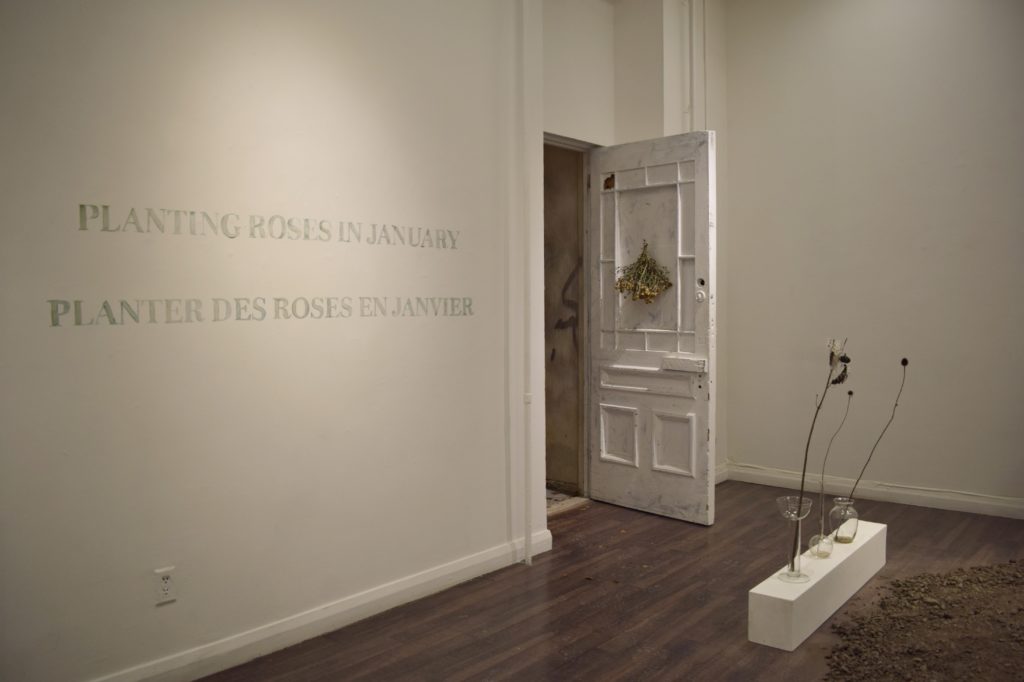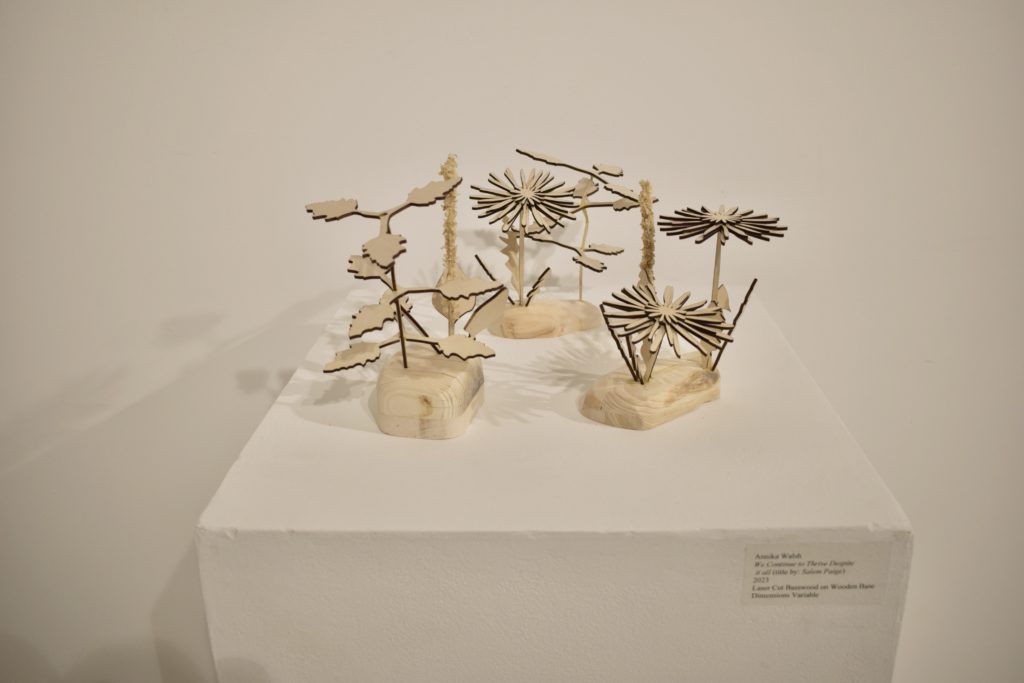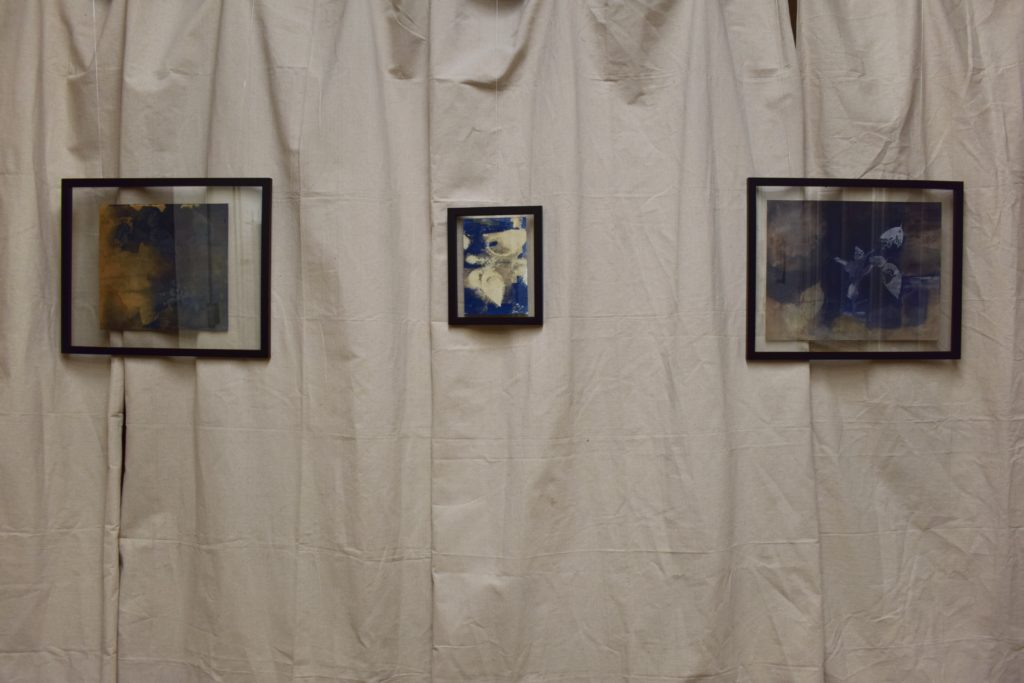Curatorial Project
“Planted… a selection of old roses… Rosa mundi, rose of the world.”
Derek Jarman, “Modern Nature” (4)
Inspired by Derek Jarman’s Modern Nature (1989), Planting Roses in January invites audiences to think about what the garden means to them. Jarman’s own garden was in a location where it should not have been possible for plants to grow, yet, against all odds, it flourished with flora and fauna of all kinds. When confronted with the fears and uncertainties surrounding a bleak future, which included his own ill health and the well-being of the planet, Jarman created the possibility of new futures.
Just as a garden can take many forms, Planting Roses in January brings together a diverse collection of artworks from Yekta Çetinkaya, Saanya Chopra, Sophie El-Assaad, Kai Holub, Sarah Hughes, Lou Koch, Susan June Robertson-Baranick, Marguerite Morin, Kalli Vath, and Annika Walsh.

The artists of this show, curated by the team of ART 4119, create their own garden, and examine what it means to them in terms of personal identity and memory, whether that be through the lens of culture, Queer ecology, or eco-feminism. Like Jarman’s own garden, Planting Roses in January hopes to highlight the artists’ themes, bringing into existence a safe, communal space where audiences can reflect upon their own shared experiences, encouraging a profound bond between humans through nature.
With consideration of the ongoing eco-crises, the exhibition incorporates sustainable practices using organic materials in gallery labels and inks. With an emphasis on personal identity and the never-ending possibilities of an environmental future filled with optimism, Planting Roses in January creates a space that asks its viewers: what does the garden mean to you?





Planter des roses en janvier
« J’ai planté une variété de roses anciennes… Rosa mundi, rose du monde. »
Derek Jarman, “Modern Nature” (4)
S’inspirant de Modern Nature (Nature moderne) publié en 1989 par Derek Jarman, Planter des roses en janvier invite le public à se pencher sur la notion du jardin et de sa signification personnelle. C’est confronté à un avenir sans issue, empreint de craintes et d’incertitude découlant de ses problèmes de santé et de la condition planétaire, que Derek Jarman manifeste, avec son jardin, de nouveaux horizons. Contre toute attente, son jardin personnel accueillera flore et faune de toutes sortes,pour fleurir dans un lieu qui aurait dû être désert.
Tout comme un jardin peut prendre de nombreuses formes, Planter des roses en janvier met de l’avant une collection de diverses œuvres de Yekta Çetinkaya, Saanya Chopra, Sophie El-Assaad, Kai Holub, Sarah Hughes, Lou Koch, Susan June Robertson-Baranick, Marguerite Morin, Kalli Vath, et Annika Walsh.
Les artistes participant et les commissaires du cours ART 4119 se sont ensemble penchés sur l’importance du jardin pour la construction de l’identité personnelle, qu’elle passe par la culture, l’écologie Queer ou l’éco-féminisme, ainsi que pour la création d’un espace sûr qui contribue a l’appartenance. Cette exposition se veut un point de départ pour favoriser un dialogue portant sur les expériences humaines et l’environnement touché par des blessures écologiques. Elle se veut un espace ouvert à la contemplation émotive et à la réflection.
En priorisant les pratiques durables et en mettant de l’avant une variété d’œuvres, Planter des roses en janvier demande à son public: “Que représente pour vous le jardin?
Text: Shems Benmosbah, Elie Crighton, Chris Glabb, Isabelle Gray, Dana Mehdipour-Haidari, Erin Szturm, Kelseigh Thompson
Exhibition by the class of ART 4119, taught by Professor Celina Jeffery.
Images and documentation courtesy of Saanya Chopra.